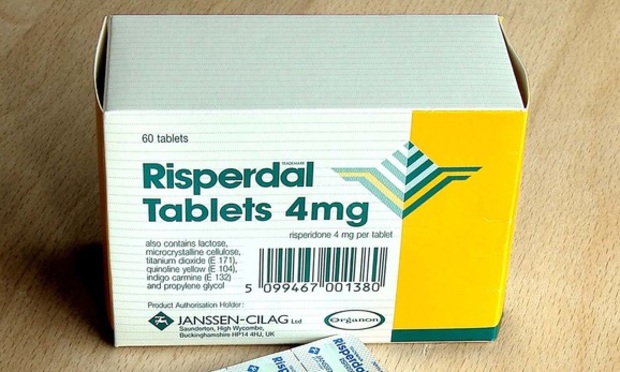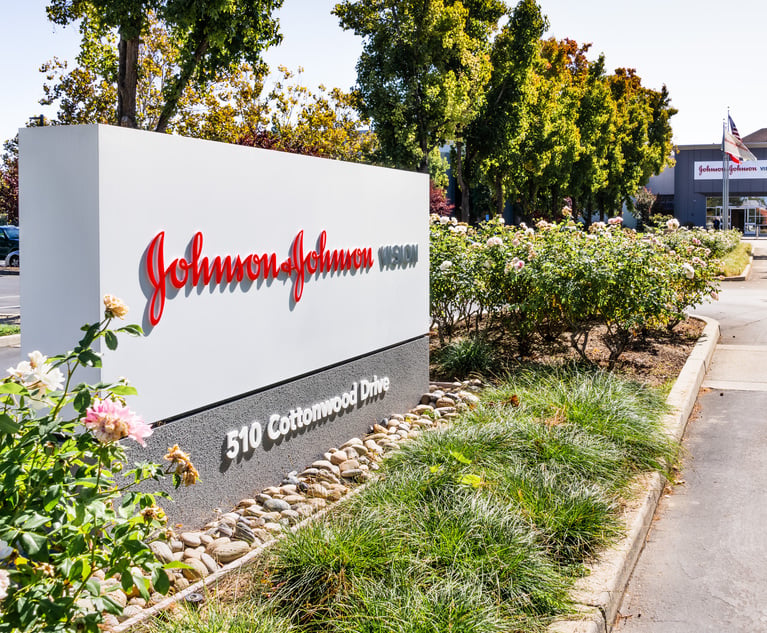Opening Statements in Risperdal Punitive Damages Trial Focuses on Alleged Push for Off-Label Use
The case marks the first time a Pennsylvania jury has been able to consider awarding punitive damages in a Risperdal case.
September 17, 2019 at 03:15 PM
4 minute read
 Risperdal. Photo: Housed via Wikimedia Commons
Risperdal. Photo: Housed via Wikimedia Commons
An attorney representing a man injured by the antipsychotic medication Risperdal painted the drugmaker Johnson & Johnson as a malicious company that pushed for the drug's off-label use in children despite evidence linking the drug to excessive growth of breast tissue in boys and young men all in an effort to maximize profits over the safety of children.
"They have a target. They know who they want to make money from: kids. And not just any kids. Kids who are the most vulnerable in our society. Kids with autism and Asperger's and ADD," Houston lawyer Jason Itkin of Arnold & Itkin told the Philadelphia jury Tuesday morning.
Itkin made the comments during the opening statement for the punitive damages phase of the case Murray v. Janssen Pharmaceuticals. The case marks the first time a Pennsylvania jury has been able to consider awarding punitive damages in a Risperdal case.
The lawyer for Janssen Pharmaceuticals, however, offered a contrasting view of the company, saying drug developers were in frequent contact with regulators and medical professionals, and that allegations over the company's conduct misrepresents the facts and second-guesses difficult decisions.
"It is easier to criticize than it is to create," Morgan, Lewis & Bockius attorney Ethel Johnson of Houston said. "Once you're heard all the evidence [you will see] that Janssen has not engaged in any conduct that's evil or with malice."
The punitive damages trial began nearly four years after another Philadelphia jury awarded the plaintiff, Nicholas Murray, $1.75 million over claims that Janssen Pharmaceuticals failed to adequately warn about the link between Risperdal and gynecomastia, a condition in which boys grow excessive breast tissue.
In early 2018, the Pennsylvania Superior Court reversed a Philadelphia judge's ruling that had barred Risperdal plaintiffs from seeking punitive damages in the litigation. The Superior Court panel, however, had determined that, instead of globally applying New Jersey law, which prohibits punitive damages, to the mass tort litigation, each plaintiff could apply the law of their home state on the punitive damages issue.
The ruling substantially raised the stakes for the mass tort, which has nearly 7,000 cases pending in Philadelphia and has seen several multimillion-dollar verdicts, including one that totaled $70 million.
And the tension was clear Tuesday, as plaintiffs counsel objected numerous times during Janssen's opening statement and the drug company moved for a mistrial once the opening statements were over.
In moving for a mistrial, New York attorney John Winter of Patterson Belknap Webb & Tyler, who is also representing the drugmakers, cited allegedly incorrect comments Itkin made about J&J's net worth and a supposed plan to make $3.3 billion selling Risperdal, as well as an allegation that J&J's CEO, Alex Gorsky, had been promoted to his current position due to his work selling Risperdal.
"There will never be any evidence in this case to support that assertion," Winter said about Gorsky. "It was done to inflame bias and ill will towards my client."
Objections made by plaintiffs' counsel, Thomas R. Kline of Kline & Specter, during Johnson's opening statement targeted references the attorney made to Murray, including her statements that the company had no malice or evil intent toward Murray or any other boy who took Risperdal. Kline argued the punitive damages trial was not about Murray, and the issues involving his specific claims had previously been litigated in the 2015 liability trial.
Judge Kenneth Powell, who is overseeing the punitive damages trial, sustained plaintiffs' counsel's objections, but denied the motion for mistrial, saying the defendants will have ample opportunity at trial to present evidence contradicting the allegedly incorrect statements.
"It's not evidence," Powell said of the opening statement. "The jury has been advised of that by me and will be [advised] again."
This content has been archived. It is available through our partners, LexisNexis® and Bloomberg Law.
To view this content, please continue to their sites.
Not a Lexis Subscriber?
Subscribe Now
Not a Bloomberg Law Subscriber?
Subscribe Now
NOT FOR REPRINT
© 2025 ALM Global, LLC, All Rights Reserved. Request academic re-use from www.copyright.com. All other uses, submit a request to [email protected]. For more information visit Asset & Logo Licensing.
You Might Like
View All
'Discordant Dots': Why Phila. Zantac Judge Rejected Bid for His Recusal
3 minute read
Pittsburgh Jury Tries to Award $22M Against J&J in Talc Case Despite Handing Up Defense Verdict
4 minute read
Plaintiffs Seek Redo of First Trial Over Medical Device Plant's Emissions
4 minute read
Trending Stories
- 1Cleary Nabs Public Company Advisory Practice Head From Orrick in San Francisco
- 2New York Environmental Legislation in 2024
- 3Cravath Hires Paul Weiss Antitrust Co-Chair
- 4Contract Technology Provider LegalOn Launches AI-powered Playbook Tool
- 5Court of Appeals Provides Comfort to Land Use Litigants Through the Relation Back Doctrine
Who Got The Work
J. Brugh Lower of Gibbons has entered an appearance for industrial equipment supplier Devco Corporation in a pending trademark infringement lawsuit. The suit, accusing the defendant of selling knock-off Graco products, was filed Dec. 18 in New Jersey District Court by Rivkin Radler on behalf of Graco Inc. and Graco Minnesota. The case, assigned to U.S. District Judge Zahid N. Quraishi, is 3:24-cv-11294, Graco Inc. et al v. Devco Corporation.
Who Got The Work
Rebecca Maller-Stein and Kent A. Yalowitz of Arnold & Porter Kaye Scholer have entered their appearances for Hanaco Venture Capital and its executives, Lior Prosor and David Frankel, in a pending securities lawsuit. The action, filed on Dec. 24 in New York Southern District Court by Zell, Aron & Co. on behalf of Goldeneye Advisors, accuses the defendants of negligently and fraudulently managing the plaintiff's $1 million investment. The case, assigned to U.S. District Judge Vernon S. Broderick, is 1:24-cv-09918, Goldeneye Advisors, LLC v. Hanaco Venture Capital, Ltd. et al.
Who Got The Work
Attorneys from A&O Shearman has stepped in as defense counsel for Toronto-Dominion Bank and other defendants in a pending securities class action. The suit, filed Dec. 11 in New York Southern District Court by Bleichmar Fonti & Auld, accuses the defendants of concealing the bank's 'pervasive' deficiencies in regards to its compliance with the Bank Secrecy Act and the quality of its anti-money laundering controls. The case, assigned to U.S. District Judge Arun Subramanian, is 1:24-cv-09445, Gonzalez v. The Toronto-Dominion Bank et al.
Who Got The Work
Crown Castle International, a Pennsylvania company providing shared communications infrastructure, has turned to Luke D. Wolf of Gordon Rees Scully Mansukhani to fend off a pending breach-of-contract lawsuit. The court action, filed Nov. 25 in Michigan Eastern District Court by Hooper Hathaway PC on behalf of The Town Residences LLC, accuses Crown Castle of failing to transfer approximately $30,000 in utility payments from T-Mobile in breach of a roof-top lease and assignment agreement. The case, assigned to U.S. District Judge Susan K. Declercq, is 2:24-cv-13131, The Town Residences LLC v. T-Mobile US, Inc. et al.
Who Got The Work
Wilfred P. Coronato and Daniel M. Schwartz of McCarter & English have stepped in as defense counsel to Electrolux Home Products Inc. in a pending product liability lawsuit. The court action, filed Nov. 26 in New York Eastern District Court by Poulos Lopiccolo PC and Nagel Rice LLP on behalf of David Stern, alleges that the defendant's refrigerators’ drawers and shelving repeatedly break and fall apart within months after purchase. The case, assigned to U.S. District Judge Joan M. Azrack, is 2:24-cv-08204, Stern v. Electrolux Home Products, Inc.
Featured Firms
Law Offices of Gary Martin Hays & Associates, P.C.
(470) 294-1674
Law Offices of Mark E. Salomone
(857) 444-6468
Smith & Hassler
(713) 739-1250





